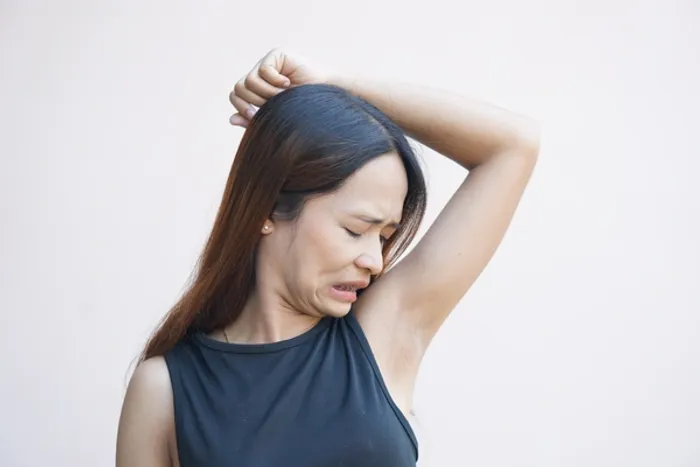Best Home Remedies to Get Rid of Smelly Armpits Naturally
Safe, science-backed smelly armpits remedy guide: beat body odor, improve sweat control, and know when to see a doctor. Easy tips you can start today.


Introduction
If you’ve ever wondered why your underarms smell even after a shower, you’re not alone. Armpit odour is common and can be frustrating, but there are simple, safe steps you can take at home to feel fresher. In this guide, you’ll find a smelly armpits remedy plan backed by trustworthy sources, plus everyday tips for body odour and sweat control. You’ll learn what really causes the smell, what works (and what to skip), and when it’s time to speak with a healthcare professional.
What Causes Body Odour?
Here’s what causes the body odour:
- Sweat itself is mostly odourless. Odour happens when skin bacteria break down sweat—especially from apocrine glands in the armpits—into compounds that smell.
- Hormones, stress, heat, exercise, and certain foods can increase sweating and odour.
- Hair can trap sweat and bacteria, prolonging odour.
- Some people naturally have stronger odour, and medical conditions like hyperhidrosis (excessive sweating) can worsen it.
Smelly Armpits Remedy: Daily Habits That Work
These simple habits reduce bacteria, lower moisture, and help neutralise odour.
- Wash daily with soap (and after heavy sweating): Use warm water and gentle soap to cleanse your underarms. If odour persists, try an antibacterial cleanser such as benzoyl peroxide (4–5%) or chlorhexidine washes. Rinse well and use as directed—these can be drying for sensitive skin.
- Dry thoroughly: Bacteria thrive in moisture. Always pat your underarms completely dry after showering and before applying products.
- Shave or trim underarm hair: Less hair means fewer places for sweat and bacteria to linger, often reducing odour.
- Use antiperspirant at night: Antiperspirants temporarily block sweat ducts. Apply at night to clean, dry skin when sweating is lower for better absorption, then reapply in the morning if desired. If regular strengths don’t work, consider clinical- or prescription-strength versions (higher aluminum chloride).
- Change sweaty clothes promptly: Keep an extra shirt for workouts or hot days. Wash activewear in warm or hot water and dry completely.
- Choose breathable fabrics: Cotton and moisture-wicking materials help sweat evaporate and limit odour buildup.
- Keep a light underarm routine: Carry underarm wipes or a clean cloth to refresh during long days.
Smart Product Choices You Can Try at Home
- Antiperspirant vs. deodorant: Deodorants mask or neutralise odour but do not reduce sweat. Antiperspirants cut both sweat and odour by limiting moisture.
- Clinical-strength antiperspirants: Look for aluminum chloride or aluminum zirconium formulas labelled “clinical strength.” Apply at night to dry skin. If irritation occurs, wash off in the morning and reapply lightly.
- Antibacterial cleansers: Using a benzoyl peroxide or chlorhexidine body wash 2–3 times per week helps control odour-causing bacteria. Moisturise afterward if skin feels dry.
- Hydrogen peroxide solution: A diluted solution can reduce surface bacteria. Apply with a cotton pad to clean skin and let it dry. Avoid broken skin and discontinue if irritation occurs.
- Deodorants with mild acids: Some products lower skin pH, making it harder for odour-causing bacteria to grow. Start slowly and patch test for sensitivity.
Consult Top Specialists
Gentle “Natural” Options—and What to Avoid
- Baking soda: Neutralises odour but may irritate sensitive skin due to alkalinity. Use only underarm-safe products and patch test first.
- Vinegar or lemon juice: Their acidity can reduce bacteria but may sting or irritate, especially post-shaving. Always dilute well and avoid broken skin.
- Essential oils: Certain oils have antibacterial effects but may cause allergic reactions. If used, dilute properly and patch test. For most people, proven antiperspirants or antibacterial washes are safer choices.
Sweat Control at Home: Lifestyle Tips That Help
Here’s how to control sweat at home:
- Manage heat and friction: Stay cool, use fans, and wear breathable layers. Absorbent underarm pads can help for long shifts or events.
- Rinse after workouts: Even a quick rinse or wipe-down removes sweat and bacteria before odour sets in.
- Watch your diet: For some, strong-smelling foods (garlic, onions, spicy foods) and alcohol worsen odour. Try reducing these temporarily to test your sensitivity.
- Stress and sleep: Stress-induced sweat (from apocrine glands) can smell stronger. Stress management and proper sleep can help regulate sweating.
- Maintain a healthy weight: Reducing friction and skin folds improves comfort and allows sweat to evaporate more easily.
Myths and Facts You Should Know
- “Antiperspirant isn’t safe.” Research does not show that antiperspirants increase breast cancer risk. Major health authorities find no consistent evidence of harm.
- “Deodorants stop sweat.” Deodorants reduce smell, not sweating.
- “More product is better.” Overusing products can irritate skin without improving results. Apply thin layers to clean, dry skin—preferably at night for antiperspirants.
When to See a Healthcare Professional?
See a doctor or dermatologist if:
- You’ve tried home steps consistently for 2–4 weeks with no improvement.
- Sudden, strong changes in odour or sweating occur.
- You have excessive sweating that soaks through clothing or affects daily life.
- You notice redness, swelling, pain, or pus (possible infection).
- You suspect an underlying medical condition.
Professional options may include prescription antiperspirants, topical antibiotics, Botox injections, oral medications, or other dermatologist-recommended procedures.
A Simple 1-Week Trial Plan to Get Started
Here’s a simple one week trial plan:
Day 1:
- Switch to a clinical-strength antiperspirant and apply at night to dry skin.
- Shower with gentle soap; use an antibacterial wash 2–3 times per week.
- Trim or shave underarm hair if desired.
Days 2–7:
- Reapply antiperspirant nightly; add light deodorant in the morning if preferred.
- Wear breathable fabrics; change after sweating.
- Track any food or drink triggers.
- Avoid overusing antibacterial products to prevent dryness.
- If irritation appears, pause and moisturize before restarting.
If odor persists after a couple of weeks, it’s time to consult your healthcare provider.
Conclusion
Smelly armpits are common, but you don’t have to live with them. With a few consistent habits—cleaning properly, choosing the right products, managing sweat, and staying mindful of triggers—you can control body odor naturally and safely. If home remedies aren’t enough, professional options can make a big difference. The key is finding what fits your skin, lifestyle, and comfort—because feeling fresh and confident starts with smart, simple care.
Consult Top Specialists
Consult Top Specialists

Dr Aakash Andgi
General Physician/ Internal Medicine Specialist
9 Years • MBBS MD
Bengaluru
Apollo Clinic, JP nagar, Bengaluru

Dr. Vivek D
General Physician
4 Years • MBBS
Bengaluru
PRESTIGE SHANTHINIKETAN - SOCIETY CLINIC, Bengaluru

Dr Syed Mateen Pasha
General Physician
2 Years • MBBS
Bengaluru
PRESTIGE SHANTHINIKETAN - SOCIETY CLINIC, Bengaluru

Dr. Anand Ravi
General Physician
2 Years • MBBS
Bengaluru
PRESTIGE SHANTHINIKETAN - SOCIETY CLINIC, Bengaluru

Dr. Ashita Kuruvilla
General Physician/ Internal Medicine Specialist
7 Years • MBBS
East Midnapore
VIVEKANANDA SEBA SADAN, East Midnapore
Consult Top Specialists

Dr Aakash Andgi
General Physician/ Internal Medicine Specialist
9 Years • MBBS MD
Bengaluru
Apollo Clinic, JP nagar, Bengaluru

Dr. Vivek D
General Physician
4 Years • MBBS
Bengaluru
PRESTIGE SHANTHINIKETAN - SOCIETY CLINIC, Bengaluru

Dr Syed Mateen Pasha
General Physician
2 Years • MBBS
Bengaluru
PRESTIGE SHANTHINIKETAN - SOCIETY CLINIC, Bengaluru

Dr. Anand Ravi
General Physician
2 Years • MBBS
Bengaluru
PRESTIGE SHANTHINIKETAN - SOCIETY CLINIC, Bengaluru

Dr. Ashita Kuruvilla
General Physician/ Internal Medicine Specialist
7 Years • MBBS
East Midnapore
VIVEKANANDA SEBA SADAN, East Midnapore
More articles from General Medical Consultation
Frequently Asked Questions
What is the best smelly armpits remedy I can try today?
Start with three steps: shower daily (and after workouts), apply a clinical-strength antiperspirant at night to dry skin, and wear breathable clothing. Shaving or trimming hair often helps. If odor persists, consider an antibacterial wash a few times per week. If there’s no improvement in a few weeks, talk with a healthcare professional.
Is it safe to use antiperspirant every day?
Yes. Antiperspirants are widely used and considered safe for daily use. Apply to clean, dry skin; nighttime application improves effectiveness. If you have irritation, switch formulas, apply less often, or ask a clinician about alternatives.
What diet changes can help with body odour?
Some people notice stronger odour with spicy foods, garlic, onions, and alcohol. Try reducing these for a week or two to see if it helps. Staying hydrated and washing workout clothes promptly also helps. If odour is severe or new, seek medical advice to rule out other causes.
How do I control sweat without irritating my skin?
Use antiperspirant at night, keep skin dry, and choose breathable fabrics. If you use antibacterial washes, limit them to a few times per week and moisturise if skin is dry. Stop any product that causes stinging, redness, or itching and try a gentler option.
When should I worry about armpit odour or sweating?
If odour or sweating is severe, sudden, or affects daily life; if you have pain, rash, or signs of infection; or if home care doesn’t help after a few weeks, see a healthcare professional. Treatments for excessive sweating and persistent odour are available and effective.




